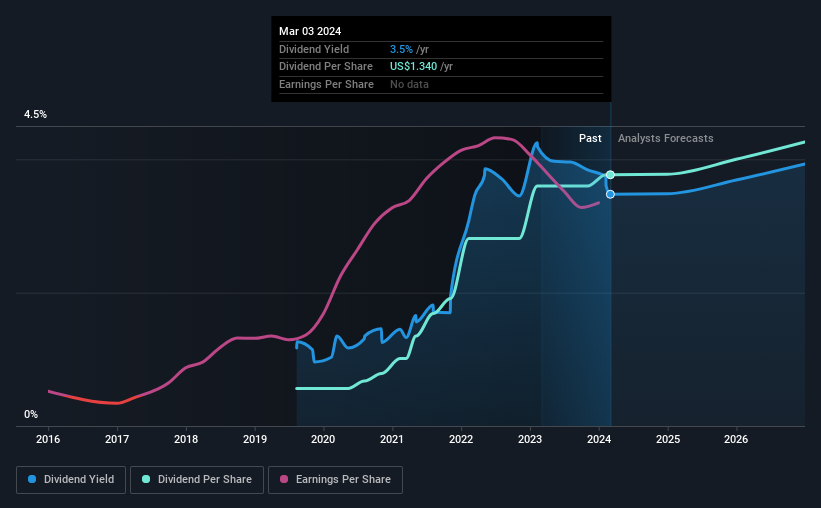Why You Might Be Interested In Victory Capital Holdings, Inc. (NASDAQ:VCTR) For Its Upcoming Dividend
Victory Capital Holdings, Inc. (NASDAQ:VCTR) is about to trade ex-dividend in the next four days. Typically, the ex-dividend date is one business day before the record date which is the date on which a company determines the shareholders eligible to receive a dividend. The ex-dividend date is of consequence because whenever a stock is bought or sold, the trade takes at least two business day to settle. Accordingly, Victory Capital Holdings investors that purchase the stock on or after the 8th of March will not receive the dividend, which will be paid on the 25th of March.
The company's next dividend payment will be US$0.335 per share, and in the last 12 months, the company paid a total of US$1.34 per share. Based on the last year's worth of payments, Victory Capital Holdings stock has a trailing yield of around 3.5% on the current share price of US$38.55. Dividends are an important source of income to many shareholders, but the health of the business is crucial to maintaining those dividends. As a result, readers should always check whether Victory Capital Holdings has been able to grow its dividends, or if the dividend might be cut.
Check out our latest analysis for Victory Capital Holdings
If a company pays out more in dividends than it earned, then the dividend might become unsustainable - hardly an ideal situation. Fortunately Victory Capital Holdings's payout ratio is modest, at just 40% of profit.
When a company paid out less in dividends than it earned in profit, this generally suggests its dividend is affordable. The lower the % of its profit that it pays out, the greater the margin of safety for the dividend if the business enters a downturn.
Click here to see the company's payout ratio, plus analyst estimates of its future dividends.
Have Earnings And Dividends Been Growing?
Businesses with strong growth prospects usually make the best dividend payers, because it's easier to grow dividends when earnings per share are improving. Investors love dividends, so if earnings fall and the dividend is reduced, expect a stock to be sold off heavily at the same time. It's encouraging to see Victory Capital Holdings has grown its earnings rapidly, up 28% a year for the past five years.
The main way most investors will assess a company's dividend prospects is by checking the historical rate of dividend growth. In the last five years, Victory Capital Holdings has lifted its dividend by approximately 46% a year on average. It's exciting to see that both earnings and dividends per share have grown rapidly over the past few years.
The Bottom Line
Should investors buy Victory Capital Holdings for the upcoming dividend? Typically, companies that are growing rapidly and paying out a low fraction of earnings are keeping the profits for reinvestment in the business. This is one of the most attractive investment combinations under this analysis, as it can create substantial value for investors over the long run. Victory Capital Holdings ticks a lot of boxes for us from a dividend perspective, and we think these characteristics should mark the company as deserving of further attention.
In light of that, while Victory Capital Holdings has an appealing dividend, it's worth knowing the risks involved with this stock. Our analysis shows 2 warning signs for Victory Capital Holdings and you should be aware of them before buying any shares.
A common investing mistake is buying the first interesting stock you see. Here you can find a full list of high-yield dividend stocks.
Have feedback on this article? Concerned about the content? Get in touch with us directly. Alternatively, email editorial-team (at) simplywallst.com.
This article by Simply Wall St is general in nature. We provide commentary based on historical data and analyst forecasts only using an unbiased methodology and our articles are not intended to be financial advice. It does not constitute a recommendation to buy or sell any stock, and does not take account of your objectives, or your financial situation. We aim to bring you long-term focused analysis driven by fundamental data. Note that our analysis may not factor in the latest price-sensitive company announcements or qualitative material. Simply Wall St has no position in any stocks mentioned.

